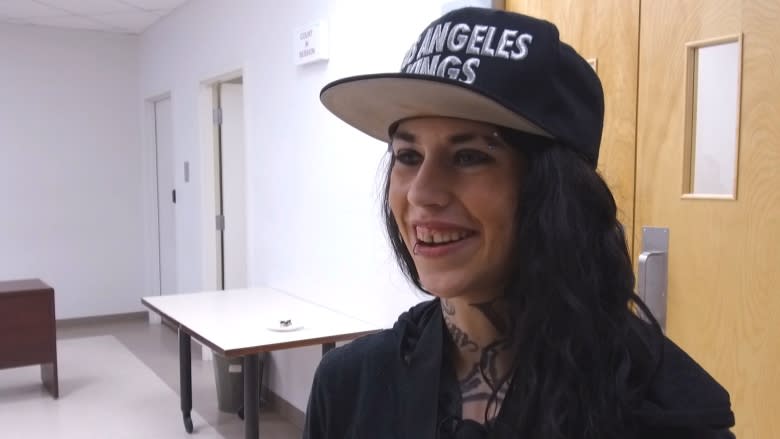Opioid court celebrates 'incredible progress' of 1st female graduate
Successfully passing through Nova Scotia's special court for opioid users isn't marked by a not-guilty verdict. It's marked by graduating.
And that's exactly what 26-year-old Danielle MacPherson did on Thursday at the Dartmouth courthouse.
"It doesn't really feel real yet. It's been a long year," said MacPherson, after receiving her certificate of completion from the court on Thursday.
"I've always believed you'll get out what you put in."
The court offers offenders a chance to get clean and avoid jail time. They must volunteer for the program and plead guilty to their crime. Since this court is only for opioid users, it's unlike other drug treatment courts in Canada.
MacPherson is the program's first female graduate and third graduate since the program started in 2014.
8 overdoses in as many years
She left the court Thursday afternoon to applause from a small group of people made up of her support workers, friends and other program participants. Together they stood outside court next to the metal detectors and shared a celebratory ice cream cake.
They were all witness to her progress. During regular court updates, each program participant must share their successes and failures through their recovery in front of each other.
When MacPherson entered the program in 2016, she'd abused opioids for eight years, attempted suicide and endured eight overdoses. She also faced two charges, mischief and assault with a weapon. The assault with a weapon charge was later dropped.
"I walked into it wanting to change myself," said MacPherson.
'Recovery is helping others'
During Wednesday's graduation ceremony, an exception was made in MacPherson's case: she walked away without a record. That's not typical protocol, the court said. Counsel explained her overall progress and lack of criminal record nixed the need for sentencing or a probation officer.
Judge Pam Williams told MacPherson she'd made "incredible progress." She said the court's approach to treatment and legal proceedings is its hallmark.
"A verdict is done to you, whereas graduation is something you accomplish," she explained. "It's about building relationships and building trust with those who've been disconnected, who don't trust the system.
"And for Danielle, part of her recovery is helping others."
Encouraging others
After MacPherson's story was first made public in January, she was contacted by a police service in Labrador. They asked her to share her story in front of a crowd of about 300 young students — some of whom later opened up to her.
"One of the kids took me out in the hall and said her mom was an addict [and] to be able to hear from my side helped her forgive her mom. So just little things like that make it all worth it," she said.
"To stay involved in recovery is kind of what's keeping me going, really."
Having obtained a clean record, MacPherson said she's free to pursue her goal of becoming an addictions counsellor.





